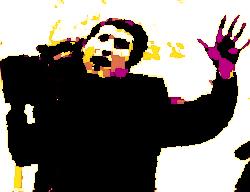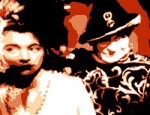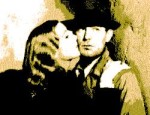Biography: life and films

It is not difficult to find fault with Lelouch's distinctive, slightly over-earnest brand of cinema. Not having attended film school or even gone to university, Lelouch was entirely self-taught and learned his craft by making mistakes. This could explain why, as a director, he is so fearless and so willing to take risks, heedless of the criticism. For Claude Lelouch, cinema has been more than a profession; it has been a way of constructing his own philosophy of life. He is guided not by formal technique, or the desire to make a radical assault on filmmaking convention (as the New Wave filmmakers had done), but by his own instincts. Lelouch's cinema may not be perfect, and some of it is pretty unbearable, but it has those essential qualities of spontaneity and sincerity. Maybe his films are a little shallow, a little too self-indulgent, but is that such a crime? If the hacks on the Cahiers du Cinéma had been a little more generous they might have recognised something of the auteur spirit in Lelouch's early cinematic disasters. Whatever you may thnk of Lelouch's cinema, we can all agree with his driving conviction that films are for audiences, not critics.
Claude Lelouch was born in Paris, France, on 30th October 1937. His father was an Algerian Jew, his mother a Catholic who adopted her husband's religion. Lelouch's love of cinema sprang from a dramatic incident in his childhood. During the Occupation, when he was four years old, he and his mother were pursued across Paris by the German police. They evaded capture by hiding in a crowded cinema, and this is where Lelouch's lifelong love affair with cinema began. Not long after he had obtained his baccalaureate, Lelouch gave up his studies and began a career as a film journalist. His first notable work was Quand le rideau se lève, a report on everyday life in the Soviet Union, filmed without the authorities' knowledge. It was whilst he was making this film that Lelouch first saw Mikhaïl Kalatozov's film The Cranes Are Flying (1957) and instantly made up his mind to become a film director. With the money he earned from this commission, he created his own film production company in 1960 - Les Films 13 (thirteen being the number of letters in Lelouch's name).
After making a series of short films about the French military for the Service Cinématographique des Armées, Lelouch made his directing debut in 1960 with Le Propre de l'homme. Lelouch was himself displeased with the film and it was bound to be a critical and commercial disaster. Whilst his next film, L'Amour avec des si (1962), was better received by the critics, his third effort La Femme spectacle was banned on account of its flagrant misogynism. His first real success was Une fille et des fusils (1964), an American-style thriller. It was whilst he was preparing an aborted sequel to this film (Les Grands moments) that Lelouch first met Francis Lai, the composer who would become one of his closest collaborators, scoring 31 of his films.
In a period of depression, Lelouch took a short break at the coastal resort of Deauville. Here, the sight of a mother playing with her child on the beach inflamed his imagination and inspired what was to become his best-known film, Un homme et une femme (1966). A classic French love story distinguished only by its virtuoso camerawork and dizzying patchwork composition, this film was a worldwide hit and won not only the Palme d'Or at Cannes but also two Oscars, for Best Screenplay and Best Foreign Language Film. Francis Lai's love theme for the film, performed by Nicole Croisille and Pierre Barouh, was a hit record the world over and became one of the best-known sounds of the 1960s. The film also established the international reputations of its two lead actors, Jean-Louis Trintignant and Anouk Aimée, who were brought together by Lelouch twenty years later for an ill-conceived sequel. At 29, Claude Lelouch had become one of the most famous filmmakers of his generation.
After this early success, Lelouch's filmmaking career was to be a continuing succession of highs and lows. His next film, Vivre pour vivre (1967), a more mellow love story featuring Yves Montand and Annie Girardot, was another global box office success, but his subsequent romance, Un homme qui me plait (1969), was a massive flop, even though it starred iconic actor Jean-Paul Belmondo. In the first half of the 1970s, Lelouch was at his most inspired and made three films that are considered among his best. The first of these was L'Aventure, c'est l'aventure (1972), a wonderfully zany look at France's political and cultural landscape in the aftermath of the May 68 uprisings against the state. Thanks in part to the unlikely pairing of Lino Ventura with Jacques Brel, this is one of Lelouch's most entertaining films and has since become a cult favourite. This was followed by La Bonne Année (1973), a superlative mélange of romance and heist movie featuring Ventura in one of his best-remembered screen roles. Toute une vie (1974) was the first of Lelouch's grand generation-spanning epics, a somewhat more palatable and better structured 20th century retrospective than the director's subsequent Les Uns et les autres (a.k.a. Bolero) (1981).
Over the next decade, Claude Lelouch had no difficult attracting big name actors - Michèle Morgan, Serge Reggiani, Brigitte Fossey, James Caan, Catherine Deneuve and Charles Aznavour are just some of the stars who were eager to appear in his films. And whilst there were some notable successes - Les Uns et les autres (1981), Attention bandits! (1986) and Itinéraire d'un enfant gâté (1988) - there were also some significant failures - À nous deux (1979), a dull thriller-romance featuring Jacques Dutronc and Catherine Deneuve, and Édith et Marcel (1983), a gloriously overblown account of the ill-fated love affair between Édith Piaf and the boxer Marcel Cerdan. In the 1990s, Lelouch's one major critical success was Les Misérables (1995), a genuinely inspired reinterpretation of Victor Hugo's famous novel, set in Nazi occupied France. This film took the 1996 Golden Globe for the Best Foreign Language Film and is among the director's most highly regarded works. This was followed by another box office success, Hommes, femmes, mode d'emploi (1996), which had a certain notoriety as it featured the disgraced politician Bernard Tapie, just after he had served a prison sentence for fraud.
Since 2000, Claude Lelouch retains his enthusiasm for filmmaking but is finding it more difficult to attract an audience. He was forced to abondon his ambitious three-part Le Genre humain project after the first part bombed at the box office in 2004. More recently, Roman de gare (2007), a stylish thriller starring Fanny Ardant and Dominique Pinon, garnered positive reviews and did well on both sides of the Atlantic. However, Lelouch's latest film, Ces amours-là (2010), a flimsy musical and cinematic fantasia, has been far less well-received. Lelouch's cinema may not be to everyone's taste, but you have to admire someone who can keep going, driven by his sheer love of cinema and undeterred by the critics' sniping and the occasional box office misfire.
© James Travers 2012
The above content is owned by frenchfilms.org and must not be copied.
Filmography
Click here to view complete list of films...French cinema during the Nazi Occupation

The best of American film noir

The very best period film dramas
